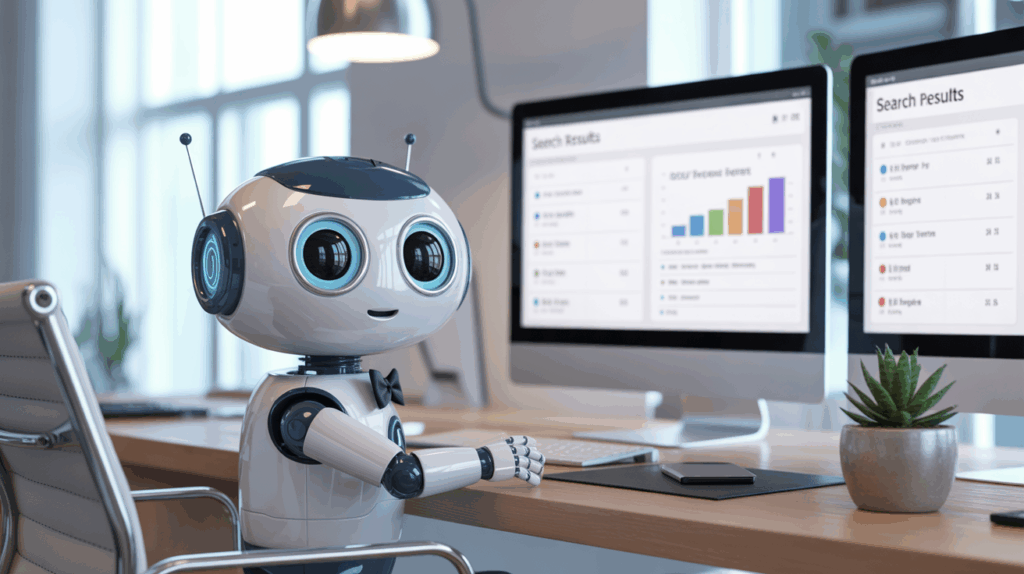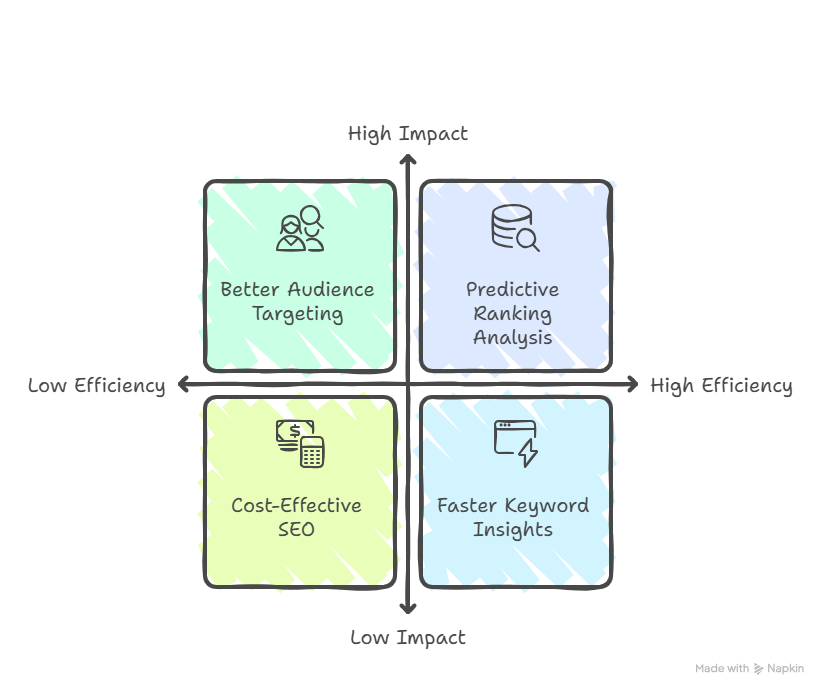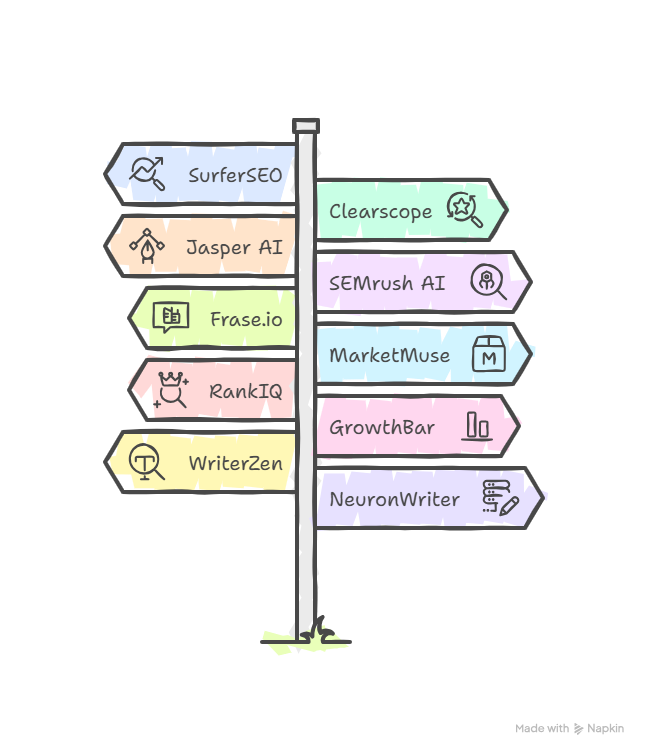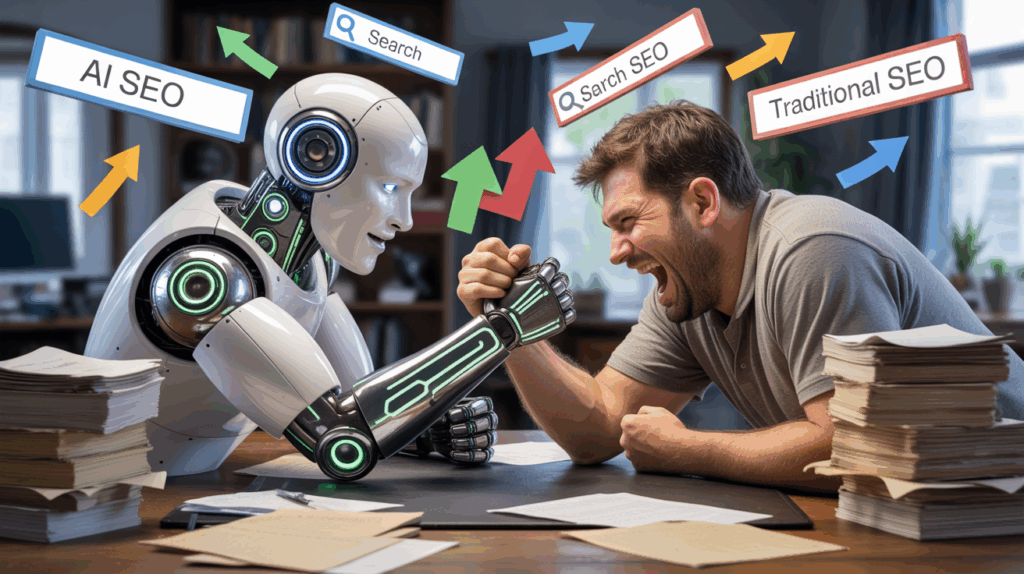SEO has always been about helping people find information online. In the past, that meant adding keywords, building backlinks, and hoping Google ranked your site higher. But in 2025, things have changed.
Now, ai seo optimization is the key to success. Search engines no longer just match keywords — they use artificial intelligence search engine optimization to understand user intent and deliver instant answers. At the same time, AI assistants like ChatGPT, Bing Copilot, and Google’s AI Overviews give users summaries instead of long lists of links.
By the end, you’ll know how to adapt and keep your website visible in the world of AI-driven search.
AI SEO optimization is the process of using artificial intelligence to improve search rankings, generate better content, and make websites more visible in both traditional search engines and AI-driven platforms.
In simple terms:
Traditional SEO focuses on ranking pages in Google by targeting keywords, building backlinks, and applying on-page SEO techniques.
AI SEO focuses on optimizing content so both search engines and AI assistants (like Google SGE, ChatGPT, or Bing Copilot) can read, understand, and reference your website in their answers.
Why It Matters in 2025
Google now shows AI Overviews at the top of results.
AI assistants provide answers without sending traffic to websites.
To stay visible, you need ai seo optimization so these systems use your content.
How Artificial Intelligence Changes SEO
Artificial intelligence is changing SEO by shifting the focus from keyword matching to user intent, context, and personalization.

1. Personalized Results
- Search results are no longer the same for every user.
- AI analyzes behavior, location, and search history to deliver tailored answers.
2. AI-Generated Answers
- Platforms like Google SGE, Bing Copilot, and ChatGPT now generate summaries and direct answers.
- This reduces website clicks but makes it essential for your content to be cited inside those AI summaries.
3. Voice Search
- More people are searching through smart assistants like Alexa, Siri, or Google Assistant.
- Optimizing for conversational queries is now part of AI SEO.
4. Visual Search
- Users can search by uploading images instead of typing text.
- Artificial intelligence search engine optimization ensures your content is optimized with proper alt text, structured data, and image tagging.
5. Shift in Ranking Signals
- Traditional SEO relied heavily on backlinks and keyword use.
- AI SEO focuses on semantic meaning, authority, and structured content that machines can easily interpret.
Artificial intelligence search engine optimization means making websites understandable and usable for AI systems that deliver answers, not just traditional search results.
Traditional SEO vs. AI SEO
| Aspect | Traditional SEO | AI SEO Optimization |
|---|---|---|
| Keyword Research | Manual keyword search | AI keyword clustering + intent analysis |
| Content Creation | Human-written, keyword-focused | AI-assisted, optimized for AI Overviews |
| Ranking Factors | Backlinks, keywords, on-page SEO | Context, structured data, semantic meaning |
| Search Results | Blue links in Google SERPs | AI-generated answers + summaries |
| User Experience | Focus on site speed and mobile usability | Personalized results based on intent and behavior |
| Analytics | Page views, CTR, bounce rate | AI-driven insights, predictive performance tracking |
| Content Updates | Manual updates by editors | AI-assisted refresh suggestions and auto-optimization |
| Voice & Visual Search | Limited optimization for voice/image queries | Optimized for conversational search and image recognition |
| Scalability | Time-consuming and resource-heavy | Highly scalable with automation and AI tools |
Benefits of AI SEO Optimization for Businesses

1. Faster Keyword Insights
AI can process huge amounts of data in seconds, which means keyword research that once took hours can now be completed almost instantly. Instead of guessing which keywords might work, businesses can identify high-value terms quickly and focus on what really matters.
2. Smarter Content Recommendations
AI doesn’t just show you keywords — it analyzes intent and trending topics. This helps you understand exactly what your audience is looking for and allows you to create content that answers their real questions, not just matches search terms.
3. Predictive Ranking Analysis
With machine learning, AI can predict how changes to your website or strategy might affect rankings. This gives businesses a clear picture of what to expect before making decisions, reducing the risk of wasted effort.
4. Better Audience Targeting
AI studies user behavior and patterns to personalize search results. With AI SEO optimization, businesses can create tailored content for specific customer groups, improving engagement and conversions.
5. Voice and Visual Search Readiness
More people are searching with their voice or by uploading images. AI SEO ensures your website is optimized for these formats by focusing on conversational content, proper tagging, and structured data that AI systems can easily understand.
6. Improved User Experience
AI tools can analyze page performance and suggest improvements in speed, layout, and navigation. A better user experience not only helps rankings but also keeps visitors on your site longer.
7. Higher Content Scalability
Producing SEO-friendly content at scale is difficult with manual work. With AI-assisted tools, businesses can create more pages, articles, and resources quickly while keeping them optimized for search.
8. Enhanced Data Analysis
AI digs deeper than traditional analytics tools by showing not just what users do, but why they do it. It can reveal hidden patterns in behavior and help businesses refine their SEO strategy based on accurate insights.
9. Cost-Effective SEO
By automating time-heavy tasks like keyword clustering, internal linking, and content briefs, AI reduces the amount of manual work needed. This makes SEO campaigns more affordable without reducing quality.
10. Competitive Advantage
Early adopters of artificial intelligence search engine optimization gain a strong edge over competitors. By ranking in AI-generated summaries and overviews, these businesses get more visibility while others still rely on old methods.
Top AI SEO Tools You Can Use

To apply ai seo optimization, you need the right ai seo tools. These tools help with keyword research, content creation, and optimization for AI Overviews. Here are the top 10:
1. SurferSEO
SurferSEO is one of the most popular AI SEO tools for on-page optimization. It helps with keyword clustering, content scoring, and analyzing competitors to create SEO-friendly pages.
2. Clearscope
Clearscope uses AI to scan top-ranking pages and suggest improvements to your content. It ensures your writing covers semantically related terms that boost authority and relevance.
3. Jasper AI
Jasper AI is a content creation tool powered by artificial intelligence. It can generate blog outlines, SEO drafts, and meta descriptions while following best optimization practices.
4. SEMrush AI
SEMrush has added AI features for keyword intent analysis, competitor tracking, and predictive ranking reports. It’s a complete solution for planning and monitoring SEO strategies.
5. Frase.io
Frase.io focuses on AI-driven content briefs, FAQs, and AI Overview-friendly answers. It’s particularly useful for writing structured content that performs well in conversational search.
6. MarketMuse
MarketMuse is an AI-powered content strategy platform. It helps you plan long-form content by identifying gaps, suggesting topics, and scoring authority to compete effectively.
7. RankIQ
RankIQ is designed for bloggers and small businesses. It creates AI-optimized content briefs and helps rank faster by targeting low-competition, high-traffic topics.
8. GrowthBar
GrowthBar combines AI content generation with SEO tools like keyword tracking, backlink analysis, and AI blog writing. It’s an all-in-one tool for digital marketers.
9. WriterZen
WriterZen uses AI to simplify keyword research, topic discovery, and plagiarism-free content creation. It’s ideal for agencies handling multiple websites.
10. NeuronWriter
NeuronWriter is a rising AI SEO tool that focuses on semantic SEO. It helps you optimize for AI Overviews by suggesting headings, FAQs, and structured layouts.
These ai seo tools work best when used together. For example, you can use SEMrush AI for research, SurferSEO for on-page optimization, and Jasper AI for content creation.
Strategies for Effective AI SEO Optimization
To get the best results from ai seo optimization, you need the right strategies. These methods help your content get noticed not only by traditional search engines but also by AI systems like Google SGE, Bing Copilot, and ChatGPT.
1. Optimize for AI Overviews (AEO)
AI Overviews are Google’s AI-powered summaries that appear at the top of search results. To get your content included, you need to write in a format AI can easily extract.
Place short, direct answers at the beginning of each section.
Use FAQ schema markup so search engines know your content is structured for questions and answers.
Add bullet points and tables to make information scannable. AI systems prefer well-structured data because it’s easier to summarize.
Example: Instead of writing long paragraphs, provide clear definitions followed by lists or comparison tables.
2. Use AI SEO Tools for Research & Content
The right tools can make artificial intelligence search engine optimization more effective and efficient. A common workflow looks like this:
Step 1: Find keyword clusters with SEMrush AI. This groups related terms so you can target multiple queries with one piece of content.
Step 2: Build topic outlines with SurferSEO. This ensures your content structure matches what search engines already reward.
Step 3: Draft content using Jasper AI. This speeds up the writing process while keeping SEO in mind.
Step 4: Add personalization and expert insights manually. AI can provide the structure, but human knowledge builds trust and authority.
This workflow ensures your blog is both AI-optimized and human-friendly.
3. Focus on Conversational & Long-Tail Queries
AI assistants like ChatGPT and Bing Copilot work best with natural, conversational language. That means your content should include questions and answers, not just keywords.
Write in a tone that feels like you’re answering a question directly.
Use long-tail queries that match how people actually speak.
Target phrases such as:
“What is the best ai seo tool for small businesses?”
“How does ai seo optimization help with AI Overviews?”
By writing in this conversational style, your content is more likely to be cited in AI-generated answers.
Frequently Asked Questions
What is AI SEO optimization?
AI SEO optimization is the use of artificial intelligence to optimize websites for search engines and AI assistants like ChatGPT or Google SGE.
How does artificial intelligence change SEO strategy?
Artificial intelligence changes SEO strategy by moving from keyword matching to intent-based results. It makes SEO more about delivering clear, helpful answers that AI systems can use in summaries and overviews.
Is AI SEO worth it for small businesses?
Yes. AI SEO optimization saves time, reduces costs, and helps small businesses rank faster.
Can AI replace traditional SEO practices?
AI will not replace traditional SEO but will enhance it. Traditional SEO builds the foundation, while AI SEO adds speed, personalization, and optimization for AI-driven search.
What are the best AI SEO tools in 2025?
Top AI SEO tools include Gemini , Chat GPT , Deep Seek , Co pilot , SurferSEO, Clearscope, Jaspera ai , SEMrush AI, and Frase.io.
Conclusion
AI SEO optimization is no longer a choice — it’s a necessity. Search engines are moving from static keyword-based results to dynamic, AI-driven answers. Businesses that rely only on traditional SEO will struggle to stay visible as AI systems take the lead in shaping search results.
By using the right ai seo tools and adopting artificial intelligence search engine optimization strategies, you can position your website to appear in Google’s AI Overviews, Bing Copilot, and other AI platforms. This approach ensures long-term visibility, stronger authority, and a competitive edge in 2025 and beyond.
If you’re ready to prepare your business for the future of search, now is the time to act. Want to future-proof your website? Explore our AI SEO services and stay ahead in 2025.

SEO Business Company is a trusted digital marketing partner in India, delivering result-driven SEO, PPC, and AI-powered strategies.We help businesses boost visibility, build credibility, and achieve sustainable growth in the competitive digital landscape.


